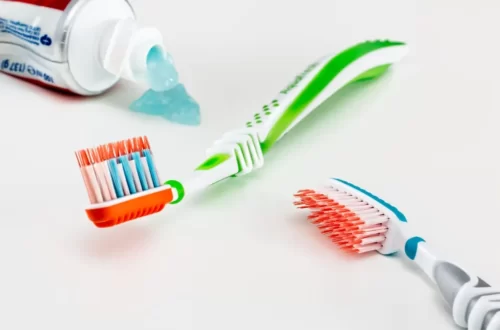
Can Cavities Cause Headaches – Reasons & Solutions
The answer to the question of whether tooth decay can directly or indirectly cause headaches is yes.
If left untreated, cavities can result in headaches. One of the biggest nerves in the head is responsible for detecting almost all headaches and toothaches.
Continue reading to learn how dental issues, headaches, and eye pain are related, as well as how to stop them.
What Are Dental Headaches?

Numerous issues, including issues with the face and jaw, tooth decay, infection, gum disease, and tooth grinding, can lead to dental headaches.
Here are some of the most typical reasons that people experience dental headaches.
Read More: Can Braces Cause Headaches
Malocclusion
Malocclusion describes when your teeth are not properly positioned when you bite. To put it another way, you have malocclusion if your teeth do not curve smoothly when your mouth is closed.
This might happen as a result of wisdom teeth that are erupting, braces, a misaligned jaw, or previous dental problems.
Your jaw muscles overcompensate if you have malocclusion to correct the alignment problems. As a result, the muscles are under stress, which may result in headache pain. This could cause headaches for you.

TMJ
When the muscles around the jaw and the temporomandibular joint (TMJ) aren’t working properly, TMJ can result.
Whiplash, sports injuries, or even holding the mouth open too wide for too long can cause TMJ.
TMJ causes the muscles to tighten, which frequently results in a shooting pain nearby. Jaw clicking or popping out of place are additional TMJ symptoms that some people may experience. Both symptoms have the potential to produce excruciating pain that radiates to the head through the face and jaw.
Read More: How Long Can A Cavity Untreated
Teeth Grinding
Teeth grinding, also referred to as bruxism, is a headache-producing habit.
Stress is a common cause of teeth grinding, and the majority of sufferers are unaware of their habit. The jaw and the muscles around it are stressed by teeth grinding. Headaches may be brought on by this tension.
When you wake up with jaw pain or nighttime headaches, it’s possible that you’re clenching or grinding your teeth at night.
Can Rotting Teeth Cause Headaches?

Headaches may result from decayed or rotting teeth.
Cavities are typically where tooth decay starts. Cavities frequently begin as tiny pinhole-sized holes in teeth that quickly enlarge into much larger holes beneath the tooth’s surface.
Even though cavities by themselves are unlikely to result in headaches, if they are not treated, they can result in infections and abcesses, both of which can.
The nerve endings in the tooth root cause pain when a tooth or the gum tissue becomes inflamed or infected. You may experience a headache in addition to your toothache because this can cause referral pain in other areas of the head.
If left untreated, gum and tooth infections may spread to other body regions via the bloodstream, which can result in a number of grave health problems.
Can Sensitive Teeth Cause Headaches?

Cavities, gum disease, exposed tooth roots, cracked teeth, decayed enamel, and worn fillings can all contribute to tooth sensitivity.
Tooth sensitivity is when you experience sudden, intense pain when consuming extremely hot, cold, or sweet foods or beverages. It often feels like a shooting pain is rising up through the tooth and is located at the base of the tooth.
Although sensitive teeth don’t always result in headaches, the problems that contribute to the sensitivity, such as decay and infection, can.
You might experience headaches, tooth or gum pain, and tooth sensitivity all at once if you have decayed teeth.
Fortunately, there are several treatments that can deal with these problems and take away your pain.
Treatment for Tooth Decay

Depending on how bad the tooth decay is, there are various treatment options.
Minor Decay
Your dentist will probably suggest dietary changes to stop the decay from spreading if there are only minor symptoms of it, such as discoloration and early enamel wear-down.
They could also coat the affected area with a fluoride gel, paste, or varnish. These coatings, which are made of fluoride, which strengthens tooth enamel and is plaque-resistant, will help safeguard your teeth from further harm.
Cavities
Depending on the size of the cavity, you may need a filling or a crown if you have teeth that have developed cavities.
A local anesthetic will be used to numb the area before starting either treatment. If a filling is necessary, the dentist will use a drill to remove the decay and then seal the area with a filling. Porcelain, amalgam, composite resin, or gold are the typical materials used to make fillings. One dental visit is all that is required to finish this procedure.
Two dental visits are frequently needed for the crown procedure. A layer of the tooth’s outer surface will be removed by your dentist first, and a mold of the tooth will be made after that. While your permanent crown is being made, you will be fitted with a temporary crown. It’ll be made to blend in with the color of your other teeth. The permanent crown will then be anchored into position with the aid of dental cement or adhesive.
Advanced Tooth Decay

A root canal procedure will probably be necessary if the tooth decay has advanced and reached the pulp in the center of the tooth.
Because the pulp must be removed and the tooth root must be repaired with a root filling, this procedure is more invasive. After determining that you need a root canal, your dentist will take steps to minimize your discomfort and keep your tooth stable before the procedure.
A numbing agent will be applied to the injured area during your second visit, and sedation may also be used if necessary. The area will be cleared of any decay or infection. The tooth root’s canals will then be modified by your dentist to create hollow tunnels. By doing this, the area will avoid becoming contaminated. For stubborn bacteria to be effectively removed, this step might need to be repeated several times.
Following the preparation of the canals, a barrier material will be used to fill and seal them. By doing this, bacteria won’t be able to return to the area. A substantial and tightly sealed restoration will be bonded to the tooth in order to restore function.
Over the course of two weeks, the root canal procedure is typically finished.
Irreparable Decay
If your dentist finds that the decay is too advanced to be treated with a restoration, your tooth will likely be extracted and replaced with an implant.
As opposed to removable dentures, dental implants are a permanent solution for missing teeth.
Read More: How Long Will Dentures Last
Traditional implants and All On 4 implants are the two different types of dental implants. Traditional implants can be used to replace a single missing tooth or multiple teeth, while All On 4 treatment replaces all of your teeth with porcelain or resin implants.
Conclusion
You may initially only experience a dull toothache that you can tolerate. Don’t ignore pain, though, if it’s severe or ongoing! In some cases, a non-invasive solution can be found by your dentist.) to alleviate your pain. For instance, it is possible to identify and treat an unstable bite that is causing headaches and muscle pain.
Abscessed teeth can be treated in a variety of ways, and cavities can be quickly repaired. Your dentist can diagnose and treat your current pain as well as offer prevention advice.
To avoid dental headaches and other serious health problems, it is important to call your dentist as soon as you experience any discomfort. Naturally, keeping your oral (and overall) health) in check can be accomplished by scheduling routine dental exams.
FAQs
What Does a Dental Headache Feel Like?
The trigeminal nerve, which runs through the tooth’s nerve pulp, can carry pain from that location to other areas of the head, giving people a headache that resembles a tension headache. Nerve pain brought on by tooth damage can, in some unlucky people, cause migraines, an even more severe type of headache.
How Do You Know If You Have a Headache from a Cavity?
Typically, headaches are not brought on by cavities. The symptoms of mild and moderate cavities may even be absent. On the other hand, tooth decay that is further along can hurt. This discomfort could be in the jaw or tooth region.
Can a Bad Cavity Cause Headaches?
What many people don’t know is that if left untreated, a bad cavity can lead to other issues and develop into a pretty significant issue, including chronic headaches. The nerve endings in an inflamed tooth may cause the pain to radiate to other parts of the head.





Average Rating